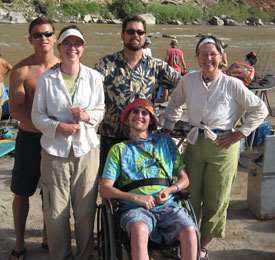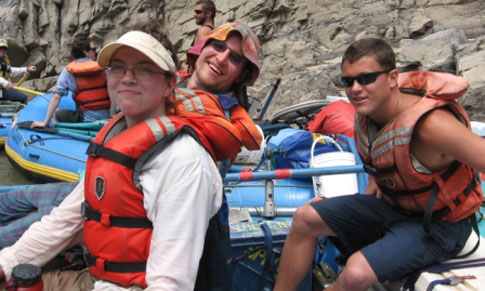Meet Sue: A Parent's Perspective
Sue Kittel was one of the individuals who received a travel grant from The FA Project to attend the 2nd Annual FA Symposium held in Philadelphia this past November.
 Here is an interview with Sue:
Here is an interview with Sue:
Q: How did the diagnosis of FA change your life?
A: The diagnosis woke me up to what having a neuro-degenerative disease means. I don't think there is anything more devastating than for parents to discover that their child has a progressive, disabling disease that has no treatment or cure. To be told that over time Aaron would lose most of his physical abilities and become dependent on others for every part of daily life brought on pain and grief that almost toppled our young family. On top of that to hear that we were carriers for this genetic disease and that there was a 1 in 4 chance each of our other children would have Friedreich's ataxia was terrifying to say the least. Fear gripped at my heart as I considered the new baby, our fourth child, growing inside my womb. I was fairly certain that Aaron's two siblings didn't have the disease, but what about this new baby? What would we do, how would be survive if more than one of our children had FA?
Q: What did you do when your second child was diagnosed with FA, also?
A: That baby I was carrying did have FA and as I suspected my other two children did not. I was determined to do something for Allie, not just stand by and wait for her symptoms to develop. At age 5, she was one of the youngest to be diagnosed prior to physical symptoms. I started her immediately on the antioxidant cocktail that was popular in 1997. I searched the internet for support and answers to my questions. Soon I located a few other "like-minded parents" and we began to compare notes via email about how to cope and help our children with this neuro-degenerative disease. It felt so good to know that I wasn't doing this alone, that others with older children had traveled the road before me. With this group of parents we started what is now the FA Parents Group (FAPG), a worldwide email based support group. I started FAPG to help me cope and ended up providing a world-wide network for other parents needing support and answers to their questions. Basically I really didn't know what I was doing and was so new to the internet, but my Higher Power kept whispering in my ear, "you can do it, just get it started". HP was right; the group pretty much manages itself these days!
Q: What advice do you have for parents of newly diagnosed FA patients?
A: 1. Find support: Local support or internet based. Take care of your physical, emotional and spiritual self. Strive for balance in life. It is easy to get overly consumed with the disease. 2. Learn about FA and the research that is going on in the world. www.curefa.org 3. Find a way to make a difference; by fundraising for research, creating awareness, or helping someone participate in a drug trial. 4. Physically there will never be a better time than now to do things with your child with FA. Do it now! Because FA is so rare (about 1 in 50,000 in the US) most of us don't live close to another family dealing with this same disease. The internet has been a life saver and a modem to connect with other families having the same challenges as we are: raising children with Friedreich's ataxia. Go to: www.faparents.org and www.curefa.org for support and information about research. Grassroots fund raising for FA gives me a way to do something about the powerlessness that I feel about this disease. It provides me with a way to make a difference, even if it is small. Combined with others the money I have raised continues to make a significant impact on funding research grants towards finding a treatment and a cure.
Q: Where do you turn to for support?
A: I have some wonderful friends but try as they might, it is difficult for them to "get" what I feel and need as a parent of a child with FA. My best support is the FAPG email list (www.faparents.org). No matter what the time of day of night I can reach out and usually get a quick connect with another parent somewhere in the world. We currently have 465 members across the globe.
Q: What resources are important to you?
A: Hands down my most important resources are: The FARA Website www.curefa.org and The FA Parents Group mailing list www.faparents.org I also benefit from the opportunities to be around other families with FA in person. I have been to about a dozen NAF conferences, held every spring www.ataxia.org. These are a great resource to meet other families with FA. Also this summer our family will host the 3rd Annual FAmily Rafting Trip on the Colorado River, a recreational opportunity for FA'ers and their family or friends http://fa-family.blogspot.com/ My FAmily just keeps growing and I am blessed every day because of it.
Q: How did attending your first FA Symposium affect you?
A: In 2009 I started a new job as one of Aaron's (now 33) caregivers. I had the 24 hour shift on Mondays and Fridays. The rest of the week my job was to oversee the other caregivers and manage Aaron's care as well as see to my family and home. I also continue to manage the FAPG mailing list. In the fall of 2009 I saw a posting on Facebook about the Symposium and then about the scholarship. As a woman newly separated and going through the process of divorce, money was tight and I was beginning to feel some caregiver burnout. I remember thinking that I had nothing to lose by applying for the scholarship and had something wonderful to gain if I was the one awarded. I could take a break from caregiving and go "fill my bucket" by rubbing shoulders with the most incredible people I know on earth. One thing I have been working on lately is to ASK and BELIEVE that I can have what I need to be healthy and happy. You can probably guess that I did get the scholarship! I had a wonderful trip and reunion with some old friends. I had a vacation, a break from caregiving and a lifting of my spirits all rolled into one trip! It was just wonderful. I believe that one of my favorite parts of the 2009 Symposium was the panel of young adults with FA who shared their experiences going to college, getting married and becoming employed. It gave me such hope for Allie (now 18) who was beginning her last year of High School at the time. How wonderful for our children with FA to have mentors that they can consult and pattern after.


